 Implications of Pakistan bombs
by M Ilyas Khan
The attack on Benazir Bhutto proves once again that the greatest
enemy Pakistan faces comes from within.
Thursday(18) night's bombers in Karachi targeted a rally that was
widely seen as a demonstration by hundreds of thousands of Pakistanis
who wanted to show their faith in liberal, secular democracy.
Ms Bhutto, twice prime minister, was able to demonstrate she remains
the country's most popular leader, and that she offers an alternative to
the rising anti-Americanism of Pakistan's opposition.
In the view of some analysts, this is important to prevent the
country from becoming a pariah state.
Fighting extremism
What the blasts prove is that no amount of security can succeed in a
country where state institutions have remained above public
accountability and often work at cross-purposes.
Pro-Taleban militants in the north-west are seen as the most obvious
suspects behind the blasts in which scores died and many more were
wounded.
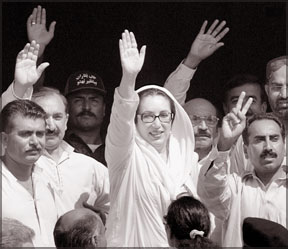 In recent weeks, at least two top militant leaders had warned that Ms
Bhutto, a "slave of the US", may face suicide attacks. In recent weeks, at least two top militant leaders had warned that Ms
Bhutto, a "slave of the US", may face suicide attacks.
The Karachi-based Muttahida Quami Movement (MQM) party is also seen
as a possible suspect.
In the past, it has had strained, often violent relations with Ms
Bhutto's Pakistan Peoples' Party (PPP).
But it is not known to carry out suicide bombings, if that is what
Thursday's attacks were.
Observers point out that the MQM has been cautious, even
accommodating, towards a possible power-sharing relationship between the
PPP and Gen Musharraf.
As a liberal and secular party itself, the MQM is on the same side of
the fence as the PPP in the emerging political scenario.
Letter to Musharraf
Ms Bhutto herself has pointed to what she says is a deeper malaise
than a straightforward militant threat.
Asked recently if the threats to her life emanated from al-Qaeda and
the Taleban, she said the Taleban "may be used" in such an attack.
In a more recent news briefing in Dubai, she indicated that her life
may be threatened by some "elements" within the government, including
some "retired army officers".
She said that she had written a letter to Gen Musharraf, spelling out
her security needs as well as a list of names of those who would be
responsible if anything happened to her.
By implication, this meant that Ms Bhutto suspected some sections of
the Pakistani intelligence apparatus and some politicians of having a
motive and the ability to use militants to kill her.
The PPP, being avowedly secular and led by a woman, was the obvious
target of both the establishment and the Islamic militants.
Election fears
Ms Bhutto's recent claims are certain to start a new round of
arguments in the country. One reason why she went ahead with a street
rally was to establish her credentials as a leader who could carry the
masses, even though many had criticised her controversial move to reach
an understanding with Gen Musharraf.
Some are critical of her decision to hold a rally with such obvious
security risks. Important questions now face Pakistan, the first of
which is the outcome of parliamentary elections scheduled for January.
Gen Musharraf will be eager for his ally, the PML-Q, to perform well.
The party provides him with an important vote bank in Punjab province,
where the PML-N party of exiled Prime Minister Nawaz Sharif is also
powerful.
The president will no doubt be wary of an onslaught by a resurgent
PPP, which could perform well in Punjab and in its traditional
stronghold in the province of Sindh.
The PPP's relationship with Gen Musharraf is complicated, but most
analysts agree that the more seats it wins in parliament, the less
responsive it will be to Gen Musharraf's orders. He may find it hard to
throw them out of power.
The president's position could be further weakened if he quits the
army, although it's thought that he will still keep his power to dismiss
governments.
At the same time, the president will no doubt be bearing in mind that
a weakened PPP is unlikely to prove effective against the spread of
militancy, an objective for which the two sides came together in the
first place.
It seem that Gen Musharraf now has two options.
He can either clip the PPP's wings and continue his monopoly of
power, or he can sacrifice some of his authority to back Ms Bhutto and
her popular appeal to defeat militants and isolate their supporters.
BBC
UN chief Ban Ki Moon skates over Antarctica row
James Bone in New York
Ban Ki Moon will become the first UN Secretary-General to visit
Antarctica when he makes an eco-trip there next month to highlight
global warming.
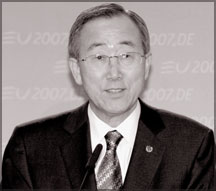
He plans to take a small plane to the airstrip at Chile's Eduardo
Frei Montalva base on the Antarctic Fildes Peninsula in the company of
Michelle Bachelet, the President of Chile, after attending the opening
of the Ibero-American summit in Santiago on November 8, diplomats say.
The trip comes as Britain prepares to lodge a controversial claim at
the UN to extend its Antarctic territory by a million square kilometres.
Britain plans to file the claim with the UN Commission on the Limits
of the Continental Shelf by a May 2009 deadline, but is almost certain
to face overlapping claims from both Chile and Argentina. Jorge Taiana,
the Argentine Foreign Minister, told reporters in Rome that his
country's claim would cover Antarctica as well as South Georgia and the
Falkland Islands, over which the two countries were in conflict in 1982.
Mr Ban will try to avoid the brewing row over territorial claims in
Antarctica to focus on global warming in the run-up to a key UN climate
change conference in Bali in December, which will discuss new limits on
greenhouse gas emissions when the Kyoto Protocol restrictions expire in
2012.
The former South Korean Foreign Minister has made climate change one
of his signature issues since taking over as UN Secretary-General at the
start of the year.
At last month's UN General Assembly he hosted more than 80 world
leaders, including US President George Bush, for a day of talks on the
threat posed by rising temperatures.
He gave warning that climate change poses as great a threat to
humanity as war, boosting Britain's bid to place global warming on the
UN Security Council's agenda as a threat to peace and security.
Last week the UN's International Panel on Climate Change, a group of
2,500 researchers from more than 130 nations set up in 1988 to study
global warming, was awarded the Nobel Peace Prize together with Al Gore,
the former US Vice-President.
Mr Ban's trip will allow him to meet face to face with scientists who
study the effect of global warming on the polar ice cap.
He may also visit other nations' Antarctic bases while at the Chilean
station, which lies only 200 yards from a Russian facility and close to
South Korean, Argentine, Uruguayan and Czech Republic installations.
On his return to New York, the UN Secretary-General will also stop
over in Brazil to venture into the Amazon rainforest to bring attention
to the threat of deforestation.
While UN officials say Mr Ban will be the first UN Secretary-General
to visit Antarctica, he is not the first senior official to do so. When
Hans Blix was appointed as the chief UN weapons inspector in Iraq in
2000, he had to be summoned back from an Antarctic cruise with his wife.
On Monday Chile said that it will claim an extended portion of the
Antarctic seabed to uphold its rights in the face of a similar step by
Britain.Earlier treaties allowed countries to claim territory only 200
nautical miles (370km) from the coast.
Alejandro Foxley, the Foreign Minister, said that Chile was planning
to file a similar claim to extend its Antarctic territory but expected
that negotiations between countries with stakes in the region would
follow.
"No one can affect the rights Chile has on Antarctic territory," Mr
Foxley said. Because of the 2009 deadline for filing a claim he said:
"We have plenty of time."
The other countries that have submitted claims to the UN commission
are Russia, Brazil, Australia, the Irish Republic, New Zealand, France,
Spain and Norway. The commission must rule on each application.
Timesonline, UK
Harsh reality of India's unwanted girls
by Ashok Prasad
Earlier this year in the southern Indian state of Andhra Pradesh,
farmer Ram Kumar made a shocking discovery.
Sticking out of the earth was a tiny human hand.
Barely audible, were the cries of a newborn baby.
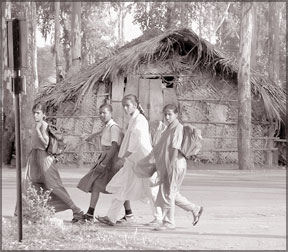
"There was a girl wrapped in a cloth and buried deep in the ground,"
said Ram Kumar.
"The baby should not have been alive but somehow it was."
The two-day old baby was rushed to a local hospital to recover from
her ordeal. Her grandfather meanwhile confessed to the girl's attempted
murder.
With seven daughters to provide for, he claimed he could not afford
the burden and expense of having yet another girl in the household.
Doctors named the girl Bhoo Laxmi, the earth goddess. She is one of
thousands of baby girls who every week are abandoned, aborted or killed,
simply because of their gender.
Boys are still prized more than girls because they will carry on the
family name and traditionally provide for parents in their old age.
Dowry burden
"From an early age, girls are made to feel they are a burden," says
Sandhya Reddy, who runs the Aarti Children's Home in the nearby town of
Kadapa.
|
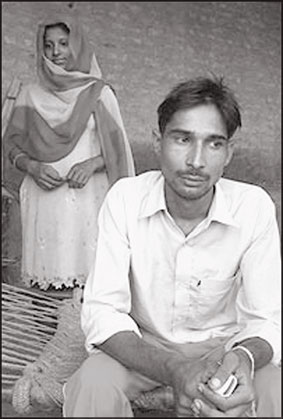
Rameher and his wife Sushma were married in 2006 |
The majority of abandoned children in the home are girls.
"Parents worry about finding the money to pay the wedding dowries of
daughters," she says.
Demanding dowry has been banned for 50 years in India but it is a
tradition that lives on across all social classes.
So great is the burden that girls are seen to place on a family, that
some believe it is better that they are never born.
In the past, infanticide was seen as one solution. Now with advances
in medical technology, many parents are resorting to ultrasound scans to
determine the gender of the baby.
If it is a girl, parents often pay for an abortion.
Sex selection tests and abortion on the basis of gender have been
banned for 15 years in India. But the law has simply forced the trade
underground.
UN figures state that 750,000 girls are aborted every year in India.
Nagalakshmi, who lives on the outskirts of Kadapa, is three months
pregnant and has paid to find out she is carrying a girl.
She is determined to abort.
Her husband Nityapujaiah says that, as labourers, they cannot afford
to have a girl: "I know it's a sin to abort but what can we do?" he
says.
Tolerated abortion
Some Indians turn a blind eye to the growing incidence of sex
selective abortions, believing it is better that a girl is killed before
birth rather than after.
|

One-year-old Harshita was abandoned soon after her birth |
But in July 2007, dozens of aborted female foetuses were uncovered in
a well belonging to a clinic that was carrying out illegal sex selection
tests and abortions in the state of Orissa.
After women's groups took to the streets in protest, half a dozen
illegal clinics were shut down.
But the reality is that, with sex selection happening behind closed
doors, this trade is difficult to control.
Sex selection is not just restricted to the poor. It is also routine
among India's moneyed middle classes, though rarely spoken about. In the
prosperous city of Ahmedabad, the commercial capital of Gujarat state,
Pooja Salot is one woman who has dared to speak out. Married to a
multi-millionaire industrialist, Pooja had twin girls 10 years ago.
Then when she got pregnant again, she claims her husband turned
violent. "He didn't want another girl. I was forced to have an
ultrasound scan," says Pooja. Then, when I was five months pregnant, I
was forced to abort."
Pooja claims that abortions of girl children are commonplace among
her wealthy friends. "For them a girl will just take money with her to
her in-laws. She won't bring wealth in," she says.
Sex selection is worst of all in the wealthy states close to the
capital Delhi. In the state of Haryana, many people have had the money
to pay for ultrasound testing for the past two decades.
Shortage of brides
Sex ratios are now some of the lowest in the country, with official
government figures showing that there are only 840 girls for every 1,000
boys.
Despite government efforts to end sex selection, it has meant there
is now a marked shortage of brides.
Twenty-four-year-old Rameher had to travel nearly 3,000 kilometres
(1,800 miles) to find his wife.
He could not get married in Haryana due to a shortage of women and
his parents were obliged to make contact with families in poorer states
like Jharkhand. "I was afraid that God hadn't destined a wife for me and
that I would be a bachelor all my life," says Rameher.
"Rameher is lucky," says his father Kehar Singh. "There are many men
who cannot get brides even in this way because they have no money. They
will die unmarried." Kehar says he will have to do the same for his
other three sons.
Back in Kadapa, 20-year-old Ramadevi has just given birth to a baby
girl. Before the baby was born, she said she would have aborted the girl
if she had had the money. She did not want a girl and did not know what
she was going to do with it.
Brimming with pride, she explains how she has decided to keep the
baby.
"Love just poured out of me," she says. "However difficult it is, I
will take care of my baby. I've got that feeling." It has meant survival
and hope for one more baby girl.
BBC
Turkish Prime Minister warns US: we will attack Kurdish rebels in
Iraq
by Martin Fletcher and Suna Erdem
Turkey will launch military action against Kurdish rebels in northern
Iraq despite frantic appeals for restraint from America and Nato, its
Prime Minister has told The Times.
Speaking hours before the PKK, the Kurdish Workers' Party, killed at
least 17 more Turkish soldiers yesterday, Recep Tayyip Erdogan said that
Turkey had urged the US and Iraqi governments repeatedly to expel the
separatists but they had done nothing.
|
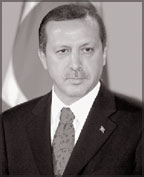
Prime Minister of Turkey- Recep Tayyip Erdogan |
Turkey's patience was running out and the country had every right to
defend itself, he said. "Whatever is necessary will be done," he
declared in an interview. "We don't have to get permission from
anybody."
Mr Erdogan, who begins a two-day visit to Britain today, also offered
a bleak assessment of relations between the US and Turkey, a country of
huge strategic importance to Washington.
He said that a "serious wave of antiAmericanism" was sweeping Turkey,
called America's war in Iraq a failure, and served warning that if the
US Congress approved a Bill accusing the Ottoman Turks of genocide
against Armenians during the First World War, the US "might lose a very
important.
The sombre and unsmiling Prime Minister was only a little less
critical of the European Union, accusing some members of reneging on
their promises to admit Turkey and claiming that the EU had inflicted a
"big injustice" on his country over Cyprus.
Mr Erdogan's belligerence will cause alarm in Washington and London,
and was probably designed to do so. One aide said that he was engaging
in "open diplomacy".
The Kurdish regional government, which has a force of about 100,000
men, has promised to resist any incursions. The PKK is threatening to
destroy pipelines carrying Iraqi oil to Turkey, and the only peaceful
region of Iraq could easily be plunged into chaos.
A Turkish attack on PKK bases in northern Iraq would also cause a
serious breach with Washington. Turkey, a predominantly Muslim country
of 75 million people, has Nato's second-largest army, is a key ally in
America's "war on terror" and provides a vital supply route for US
troops in Iraq and Afghanistan.
Late last night Mr Erdogan said that Condoleezza Rice, the US
Secretary of State, had asked Turkey to delay any action for a few days.
He told Dr Rice he expected "speedy action" from the US.
But in his interview with The Times Mr Erdogan was in no mood to heed
Western appeals for restraint. The PKK was hiding behind the US and
Iraqi governments, he complained. It was using American weapons. "We
have told President Bush numerous times how sensitive we are about this
issue but have not had a single positive result."
The targets were not innocent civilians or Iraq's territorial
integrity but a terrorist organisation that regularly attacked Turkish
targets, he said. "If a neighbouring country is providing a safe haven
for terrorism . . . we have rights under international law and we will
use those rights and we don't have to get permission from anybody."
Military action could be avoided only if the Americans and Iraqis
expelled the PKK, closed its camps and handed over its leaders, he said.
Mr Erdogan said that last week's parliamentary vote authorising
military action showed that Turkey's patience was exhausted. He would
not be drawn on the scale or timing of any operation, but Turkey is
thought to have more than 60,000 soldiers massed along the Iraq border.
Other Turkish officials said that the PKK had six training camps and
3,500 fighters in the mountains of northern Iraq.
Mr Erdogan also rebukedThe Times for publishing an interview last
week with Murat Karayilan, a PKK leader in northern Iraq. He said that
the newspaper had allowed itself to be "used as a propaganda tool".
Mr Erdogan will speak in Oxford tonight and meet Gordon Brown
tomorrow. He is likely to rebuke the US on several counts. He said that
the war in Iraq had fuelled Turkish hostility towards the US. "There's
no success that I can see," he said. "There's only the deaths of tens of
thousands of people. There's just an Iraq whose entire infrastructure
and superstructure has collapsed."
He accused the Democrat-controlled foreign affairs committee of
"firing a bullet" at US-Turkish relations by approving the "so-called
Armenian genocide Bill". "America might lose a very important friend,"
he said.
Mr Erdogan also had harsh words for some European countries. France,
Germany and Austria are openly opposed to Turkish membership of the EU.
He said that Britain had supported Turkey from the start, but other
states who agreed to open accession talks in 2005 were "not standing by
their word". He said that Turkey was "far more advanced" than the most
recent entrants from Central Europe.
He identified Cyprus as the main obstacle, and said that the EU
perpetrated a "big injustice towards Turkey and the [Turkish] northern
Cypriots". In a referendum in 2004 Turkish Cypriots approved a UN plan
to reunite the island whereas the Greek Cypriots rejected it. He
protested that the Greek Cypriots were rewarded for their obstinacy with
EU membership while the Turks were punished.
Timesonline, UK |
